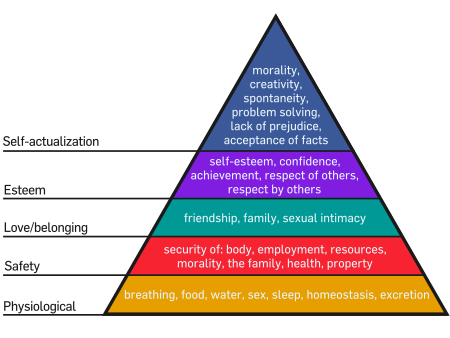Maslow’s idea was that we work on the lower-level desires first, and when those are met, we move up to pursue the next higher level of desire. But that can’t be quite right. Sleep, for example, is a first-level, basic physiological desire. Yet lots of us are sleep deprived – and we gave up sleep to put in longer hours at work to better meet those higher-level esteem needs. Some of us even give up sleep, food, comforts, security in order to pursue self-actualization desires to be creative, compassionate, and at peace. Experience seems to show that those desires at the top of Maslow’s pyramid do not, in fact, depend on the lower desires first being met.
You might say that the story of Siddhartha, who became the Buddha, fits the basic picture. He was a prince, grew up in luxury and high status, and, with those lower needs not occupying his worry, moved on to seek self-actualization. On the other hand, the story of Jesus, who became the Christ, is story of a person in poverty and very low status who turned to self-actualization without ever really nailing down those security desires. We also know that most people who are plenty wealthy enough to have the first four levels of need met do not move on to the kind of self-actualization that Jesus and Siddhartha did. So meeting the supposedly lower-level desires turns out to be neither necessary nor sufficient for pursuing the very highest-level desires.
Most of us do sacrifice a lot for status – for the admiration, respect, and even, if possible, the envy of other people. We work hard to project that image calculated to induce other people to think well of us. To finance all this image-projection, we might spend our adult life in a job we hate – pretending to love it, because, after all, it’s not very admirable to be stuck in a job you hate.
Arthur Schopenhauer, a 19th-century German philosopher, wrote that
“almost all our sufferings spring from having to do with other people.”He adds that
“The [Greek philosophers known as the] Cynics renounced all private property in order to attain the bliss of having nothing to trouble them; and to renounce society with the same object is the wisest thing [one] can do.”Our desires are like an ultra-headstrong five-year-old inside our psyche: a child who “never tires of whining, whose whining can’t be avoided” (Irvine). We are like the parents who give-in, who find that the only way life will be tolerable is to give the child what it wants most of the time. Good parenting, though, we know, while it does mean saying ‘yes,’ a lot, it also means standing fast on ‘no,’ sometimes – for the sake of the child’s and the family’s long-term good. And, often, it involves skillful negotiated substitution.
“No, you can’t have that candy bar now. You’ve already had one today. I want to respect that you are hungry. I hear that, and I share your concern about that. We do have fruit available. And, you may have another candy bar tomorrow.”Or we bargain:
“Tell you what, if you’ll clean up your room and empty all the trashcans in the house, you can have the candy bar.”Learning to wisely live with our desires is a lot like learning to wisely live with a demanding five-year-old. To get good at it means getting good at recognizing when indulging is unwise, and, in those cases, getting good at using substitution and bargaining.
For many adults, that whining inner child is whining for more success – which means recognition by others of accomplishment.
“Success is very much like a drug: it makes you feel good; you don’t know what your are missing until you experience it; once you experience it, you want more; and in your attempts to recapture that first high, you will have to resort to ever bigger ‘doses.’ And if success is like a drug, some drugs are like success: a cocaine high, [as I understand], very much resembles the rush of success.” (Irvine)We are built to crave that drug of success: we are born to be addicted to it. Yet, it is a never-ending treadmill – and it never allows us to be satisfied, content with our life. We are hijacked by desires many of which will not improve our lives. Denying and repressing them just makes them stronger. Noticing and looking at them, though, weakens them. Many times, in the light of conscious attention, they simply vanish.
* * *
This is part 4 of 5 of "Desire!"
Next: Part 5: "To Have All You Want, Want All You Have"
Previous: Part 3: "Two Thought Experiments"
Beginning: Part 1: "Fields of Dreams, Streetcars of Desire"



No comments:
Post a Comment